Galileo
Danny Strong (Book); Michael Weiner & Zoe Sarnack (Music & Lyrics)
Berkeley Repertory Theatre
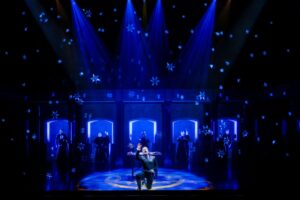
From one side we hear, “Science asks the questions; the Bible has the answers;” from the opposing view, “The Scriptures is a book about going to heaven; it is not a book about how the heavens go.”
Sounds like countering arguments made in some current, state supreme court or on last Sunday’s TV talking heads show? That they are views almost five hundred years old at a time scientific proof pointed to the earth rotating the sun while the Church doctrine demanded everyone believe the earth is the stationary center of the universe makes us wonder how far have we actually come in a half millennium. Are we in fact returning to a time when facts mean little and doctrines – be they religious or political – are actually the prescribed source of truth by so many?
That troubling dilemma is exactly what makes Berkeley Repertory Theatre’s world premiere of Galileo (Danny Strong, book) so incredibly current in its startling messages even though it is actually the 1633 story of how Galileo Galilei was condemned and imprisoned by the all-powerful, all-knowing Church for speaking truth as seen through his newly constructed telescope. By telling the story largely through rock music (Michael Weiner & Zoe Sarnack, music & lyrics), Galileo’s historical parallels with our own modern world strike a resounding chord in songs and beats that could send any rock concert audience to their feet in appreciation and applause. Berkeley Rep’s Galileo is a riveting, spell-bounding story with rousing, memorable music produced on a grand stage full of eye-popping, jaw-dropping effects. Most importantly, Galileo has its own galaxy of sparkling stars – principal actors and a huge ensemble that sing to person with staggering power, emotional credibility, and heavenly clarity. Galileo is a must-see production that has the Great White Way blazing across its probable, future orbit.
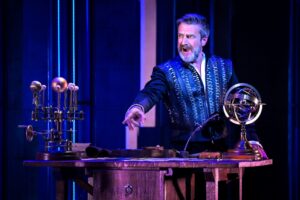
Raúl Esparza is a Galileo to be recorded in future books about American musicals. Every moment he is on stage – and he is rarely not front and center during the entire two hours, thirty minutes – he exudes an electric charge of intensity that permeates the entire theatre. When he sings, his voice pierces the air with crackling vigor, often accompanied by rock-star moves of jumps, body turns/twists, and fist pumps in the air to emphasize Galileo’s excitement about his discoveries, his intent to tell truth as he sees it, or his frustration/anger when the Cardinals (or even Pope) dare not to see and accept the obvious facts that the heavens are revealing to them through his magnificent telescope. Sure, his Galileo is clearly ego-centric and can smart-mouth any one he feels is a fool, and maybe even he would even agree with one Cardinal’s observation that “you are the disdain of most people.” But he is also deeply religious and a devout Catholic in his own way, often on knelt knees praying, “I beg the strength and courage finding the sun and the stars.”
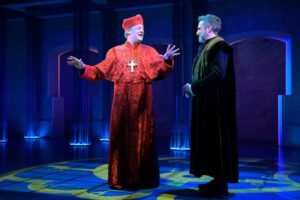
While Church officials like Bishop Grasso (Bradley Dean) and Cardinal Morosini (Javier Muñoz) scheme and plot with relish and sung determination to thwart the teachings and ban the writings of Galileo, he does find a friend and a fellow lover of science in Bishop Maffeo Barberini (Jeremy Kushnier) whose star in on the rise in the Catholic hierarchy. When Galileo and Barberini agree on an approach for the scientist to continue his work within accepted Church doctrine, the two sing a triumphant, trumpeting duet of optimism, “Believe the day is coming soon, and we’ll show the world the truth.”
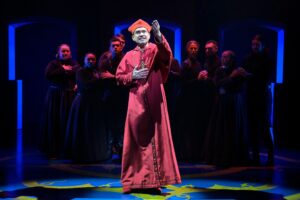 Galileo’s construction of the first telescope sees the valleys and mountains of the moon, the rotating moons of Jupiter, and thousands upon thousands of stars never viewed before. Not too surprising, the attacking Bishop Grasso refuses even to look through the instrument (after all, there are rumors that Galileo has filled his telescope with crystals to give the deception of stars). (Again, the current similarities to today’s deniers of science are palpable.) However, Cardinal Barberini excitedly takes a look, leading to a gorgeously tender, sung poem he writes in Galileo’s honor, singing in soft, loving falsetto, “Through your eyes … by your light, I see.”
Galileo’s construction of the first telescope sees the valleys and mountains of the moon, the rotating moons of Jupiter, and thousands upon thousands of stars never viewed before. Not too surprising, the attacking Bishop Grasso refuses even to look through the instrument (after all, there are rumors that Galileo has filled his telescope with crystals to give the deception of stars). (Again, the current similarities to today’s deniers of science are palpable.) However, Cardinal Barberini excitedly takes a look, leading to a gorgeously tender, sung poem he writes in Galileo’s honor, singing in soft, loving falsetto, “Through your eyes … by your light, I see.”
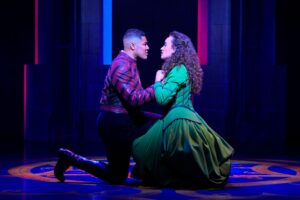
Galileo’s other partner in pursuing the truth of the heavens is his own daughter, Virginia, who often brings clarity to his thinking through her questions and her own observations of the stars. Madalyn Mathews time and again is awarded some of the evening’s most heartfelt applause with a voice that is beautifully clear and both tonally mesmerizing and astoundingly powerful. Whether during a sung ballad in a captivating duet with a Young Nun [Zalah Brenae Vallien) or in a full-on rock duet full of impassioned notes of the love between her and her intended – Alessandro Tarantola played by powerhouse actor and singer, Christian Magby – Madalyn Mathews makes her presence known in ways long to be remembered. That is especially true as her voice rings with heart-pounding resolve in her final plea to her imprisoned father, “When Does the Truth Cost Too Much?”
Throughout the story’s progression, the musical particularly soars when large ensemble numbers overtake the stage, often reminding us again of scenes and trends of our own modern days. When the Calvanist Bruno Giordano (Adam Halpin) dies at the Inquisition’s fiery stake with a final, excruciating sung cry that lasts an eternity, a crowd of the faithful below rejoice for the Church elders to see, bending and bowing while singing “Faith.” Likened crowds of the faithful explode into revival-like exuberance when Cardinal Barberini appears as the newly named Pope Urban VIII, with hands pumping, bodies gyrating, and some even collapsing in spasms (only one example of Brian Usifer’s exciting and eclectic choreography).
As Galileo’s telescope gains popularity, the gathered populace circles looking to the sky, singing with harmonized anticipation of “whispers [that] start small … [but] keep on until they are everywhere” – their proof that truths seen with own eyes cannot be covered up that easily by denying powers to be. The many roles and ways Director David Neumann creatively employs the much-talented ensemble add tremendously to their thrilling, oft-breathtaking numbers, large and small.
Beyond the outstanding cast, direction, and script, the spectacle created onstage by the scenic, lighting, costume, and projections designs are almost impossible to describe even a fraction of their compelling effects. Rachel Hauck’s massive, two-level stage setting features numerous columns and portals whose shapes are both late Renaissance and modern in appearance – the latter especially when wrapped in mood-shifting, sight-amazing LED lights that are coupled with colorful spots and floods (Kevin Adams, lighting designer). From nuns and bishops to Popes and rulers, patricians and humble faithful, Anita Yavich’s costumes are like a history museum ‘s display.
But the part of the night’s stage design that particularly dominates with its brilliance, its glorious colors, and its artistic depictions of the religious, secular, and astronomical themes of the evening are the three-walled projections designed by Jason H. Thompson and Kaitlyn Pietras. I can honestly say that as a frequent, many-year theatergoer, I do not think I have ever seen such a phenomenal and massive array of illuminating historical and heavenly projections on a stage.
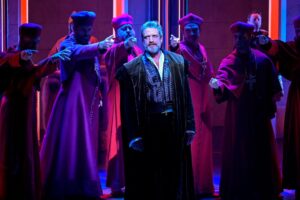
Anyone familiar with the familiar history of Galileo or who has seen any of the numerous, past plays focusing on his story knows that his fate turns from hero to demon in the eyes of the Church (including the new Pope, his former best friend). Just as in today’s world, the need for sustained power of a ruler – be it military, national, or religious … or in this case, all three in one Pope – can lead a friend to become a foe. This latest Galileo proves that point in a heart-beating, heart-breaking manner through its gripping music, choreography, and staging.
But Danny Strong’s script and Brian Usifer’s directorial insight leave us with a departing note of hope that what Galileo learned and did, can and will happen today. Even after years in prison, Galileo learns before he dies that he is leaving a final legacy by inspiring thousands of people in the mid 1600s and beyond to seek truth and to challenge denying authorities. A final ensemble appears around him singing in intertwining harmonies, “When we trust, the truth will follow us.” Those believers are now dressed in the everyday clothes we might see walking down any street in America – everyday people who have seen through the fake news, the lies, and the denials.
Rating: 5 E, MUST-SEE
A Theatre Eddys Best Bet Production
Galileo continues in an extended, world premiere run through June 23, 2024, by Berkeley Repertory Theatre in the Roda Theatre, 2015 Addison Street, Berkeley, CA. Tickets are available online at www.berkeleyrep.org , by calling the Box Office Tuesday – Sunday, noon – 7 p.m. at 510-647-2949.
Photo Credits: Kevin Berne
